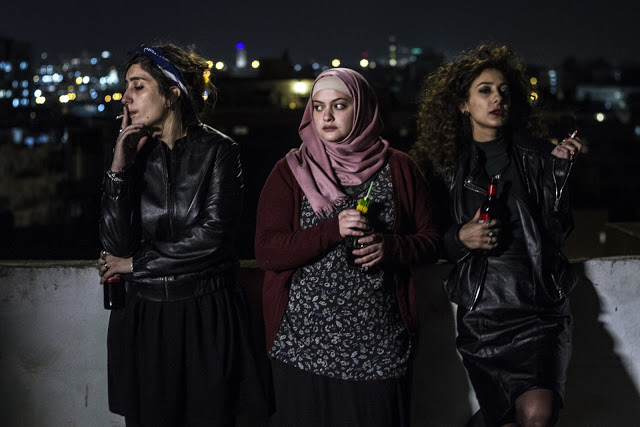
This Director Got Death Threats. Her Work Will Open the Other Israel Film Festival Tomorrow.
Two of the film’s “in betweens,” lawyer Laila and DJ Salma are part of the Tel Aviv partying, coke-snorting underground Palestinian club scene. To a hot original soundtrack, the gorgeous, chain-smoking Laila heads out into the night with male friends who call the women sluts. She doesn’t care.
Into their lives comes the sheltered, hijab-wearing Nour. Somebody’s cousin from the conservative Arab town of Umm-al-Fahm, she moves into their apartment to study for her university exams. A religious Muslim, engaged to be married, she is clearly in between.
Americans aren’t the only ones unfamiliar with the 20-something hip Palestinian scene. While American movie goers can usually tell a feature from a documentary, the fatwa was issued following what Hamoud describes as officials in Umm-al-Fahm thinking the scenes of straight and gay sex, drinking, and drugs were a shameful documentation of young Palestinians. (To us hard-to-shock Americans, “In Between” looks a bit like a made-for-television feature or the launch of a TV series.)
Part of elusive reality, “M.G. Saad,” credited with the Arab party music, doesn’t exist. Hamoud says the fictitious name protects the artist in a country without diplomatic relations with Israel.
The top Israeli filmmaker Shlomi Elkabetz, who was Hamoud’s film school teacher, became her producer. Most touching, the film is dedicated to Shlomi Elkabetz’s sister, the beloved, dead-too-young star Ronit Elkabetz. Her final film, “Get,” co-produced with her brother, politicized Israelis with its depiction of a woman unable to receive a divorce (“get” in Hebrew) from her husband or the religious courts in control of Israeli marriages.
The Other Israel Film Festival runs Nov. 2-9 under the direction of Isaac Zablocki, director of the JCC’s Israel Film Center.
One film I’ll be watching Nov. 4, “The Promised Band,” documents a group of Israeli and Palestinian women with little musical talent forming a rock group as a way to meet, crossing borders at times illegally.
An award-winning documentary that promised to be tough to watch has been cut from the festival since it’s available online. “Death in the Terminal” uses security camera footage to sift through the chaos of a mob lynching an Eritrean refugee mistaken for a terrorist at the Be’er Sheva bus terminal.
Not all grim, “Holy Air” closes the festival. It’s the story of an Arab-Christian who starts bottling “holy air” for tourists.
The festival includes free screenings of shorts on Nov. 4. Expanding Carole Zabar’s commitment to film as a first step for social action, Nov. 5 breakout sessions bring together activists following “The Field,” the New York premiere of one man’s attempt to start a Palestinian Center for Nonviolence.
A few screenings take place away from the JCC’s Upper West Side mother ship—at the JCC Harlem on West 118th St. and at the NYU King Juan Carlos Center on Washington Square South.
Program and tickets available online at otherisrael.org or by phone 646-505-5708.
Some OIFF films can be seen at israelfilmcenterstream.org/.
FYI from 2016: Carole Zabar—The Woman Behind the Other Israel Film Festival.
The views and opinions expressed in this article are the author’s own and do not necessarily reflect those of Lilith Magazine.



